BM561: Business Consulting CW1 Research Report Analysis 2019-20
VerifiedAdded on 2023/01/10
|8
|1879
|25
Report
AI Summary
This report, a Business Consulting CW1 assignment for the BM561 module, analyzes the UK education sector focusing on Fairfield School of Management and London School of Science and Technology. It begins with an executive summary, introduction, and problem statement, identifying challenges like human resource shortages and increased competition. The report then delves into an industry analysis using the PESTLE framework, examining political, economic, social, technological, legal, and environmental factors affecting the sector. Key client issues, including lack of adequate human resources, market entrants, and political disagreements, are discussed. The report concludes with recommendations, such as adopting new technologies, modernizing educational approaches, and hiring skilled professionals. References are included to support the analysis and findings.
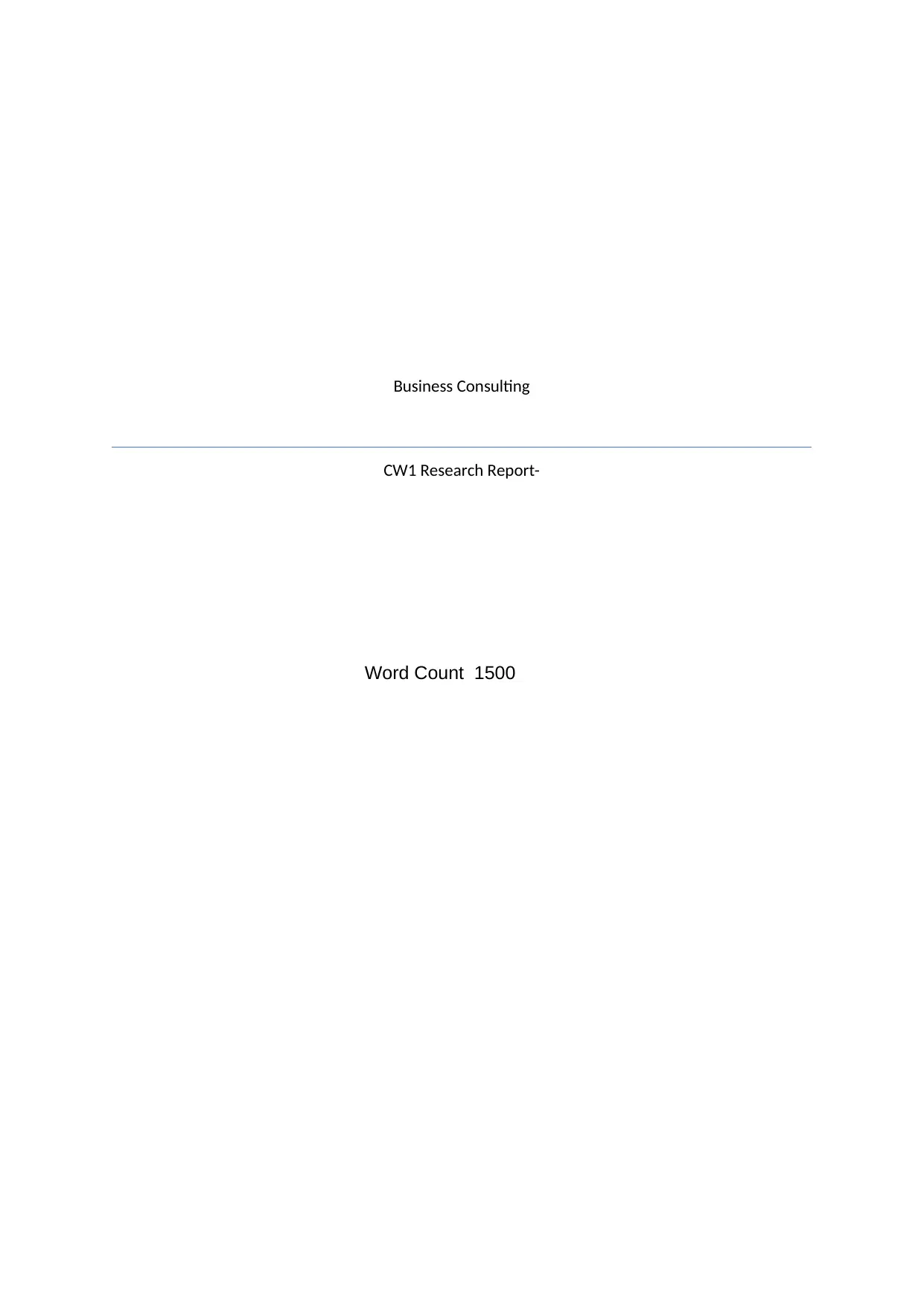
Business Consulting
CW1 Research Report-
Word Count 1500
CW1 Research Report-
Word Count 1500
Paraphrase This Document
Need a fresh take? Get an instant paraphrase of this document with our AI Paraphraser
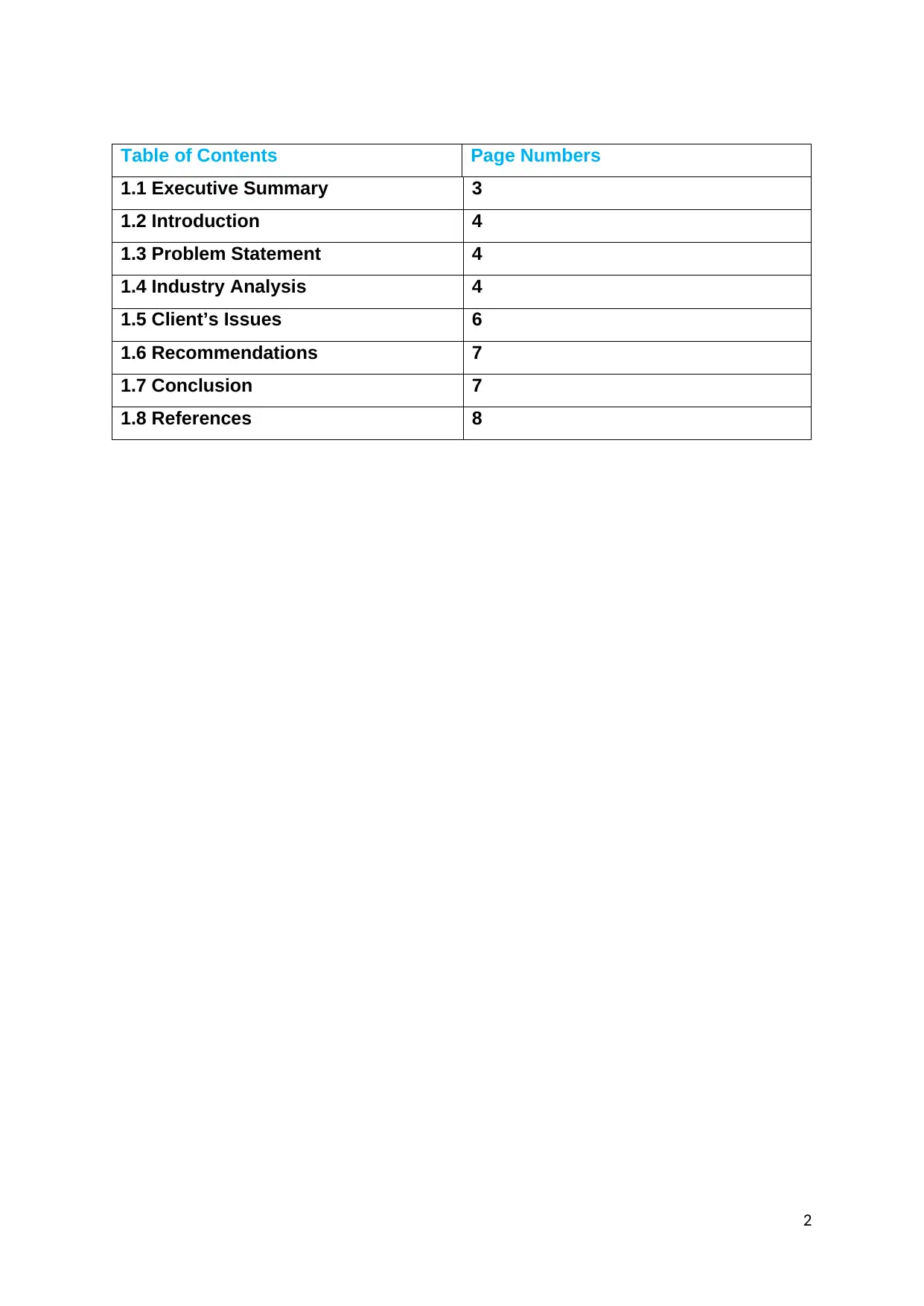
Table of Contents Page Numbers
1.1 Executive Summary 3
1.2 Introduction 4
1.3 Problem Statement 4
1.4 Industry Analysis 4
1.5 Client’s Issues 6
1.6 Recommendations 7
1.7 Conclusion 7
1.8 References 8
2
1.1 Executive Summary 3
1.2 Introduction 4
1.3 Problem Statement 4
1.4 Industry Analysis 4
1.5 Client’s Issues 6
1.6 Recommendations 7
1.7 Conclusion 7
1.8 References 8
2
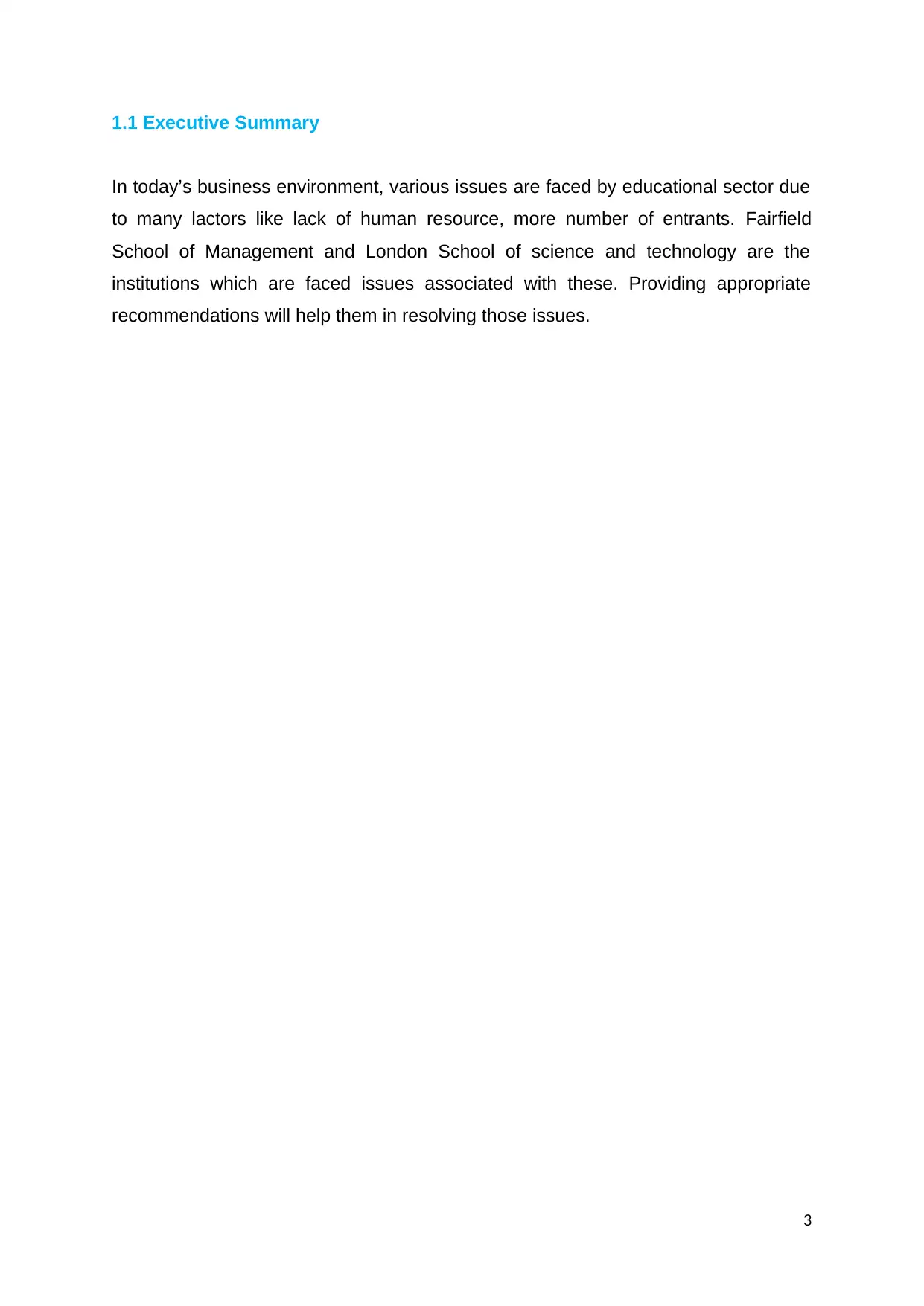
1.1 Executive Summary
In today’s business environment, various issues are faced by educational sector due
to many lactors like lack of human resource, more number of entrants. Fairfield
School of Management and London School of science and technology are the
institutions which are faced issues associated with these. Providing appropriate
recommendations will help them in resolving those issues.
3
In today’s business environment, various issues are faced by educational sector due
to many lactors like lack of human resource, more number of entrants. Fairfield
School of Management and London School of science and technology are the
institutions which are faced issues associated with these. Providing appropriate
recommendations will help them in resolving those issues.
3
⊘ This is a preview!⊘
Do you want full access?
Subscribe today to unlock all pages.

Trusted by 1+ million students worldwide
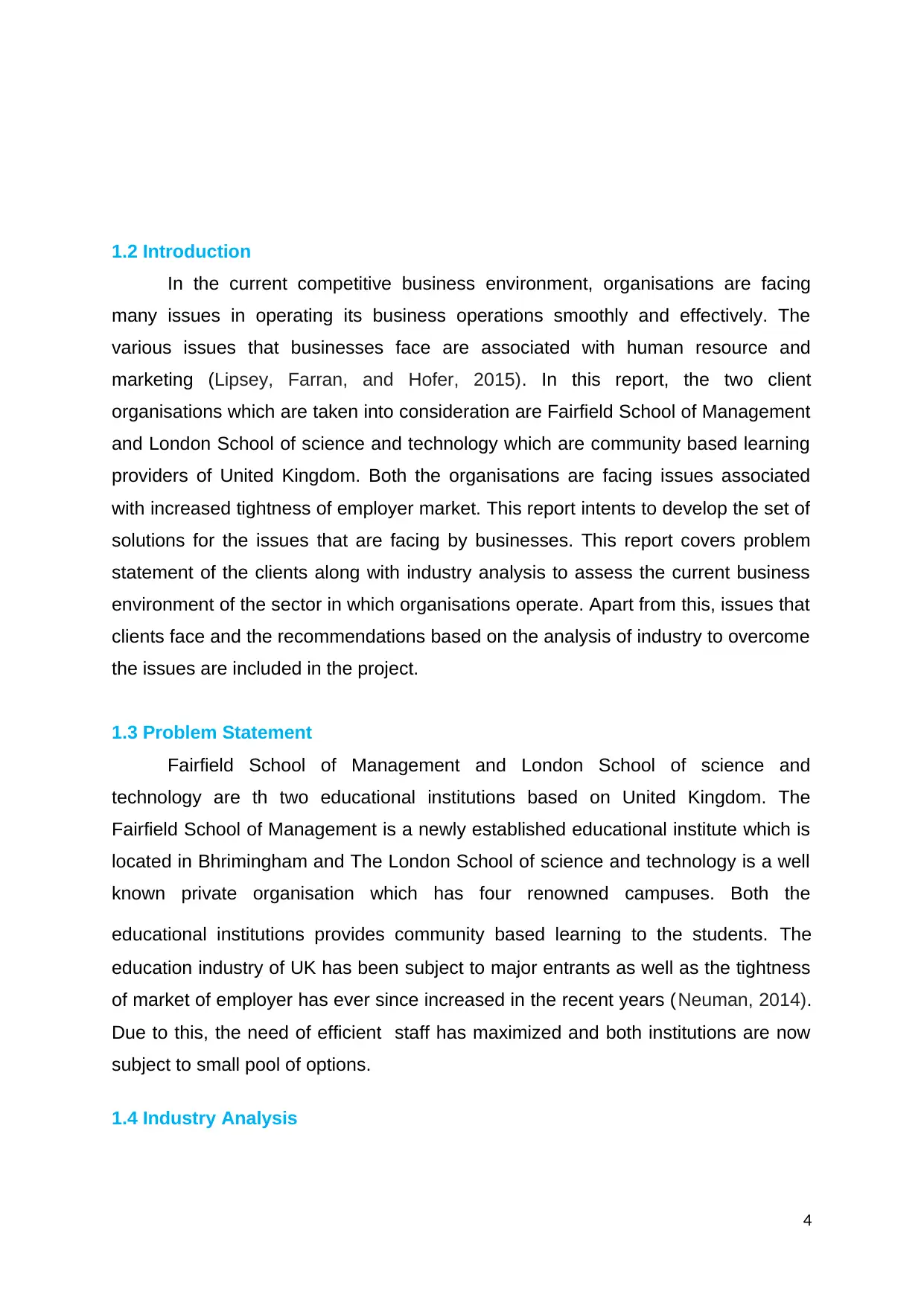
1.2 Introduction
In the current competitive business environment, organisations are facing
many issues in operating its business operations smoothly and effectively. The
various issues that businesses face are associated with human resource and
marketing (Lipsey, Farran, and Hofer, 2015). In this report, the two client
organisations which are taken into consideration are Fairfield School of Management
and London School of science and technology which are community based learning
providers of United Kingdom. Both the organisations are facing issues associated
with increased tightness of employer market. This report intents to develop the set of
solutions for the issues that are facing by businesses. This report covers problem
statement of the clients along with industry analysis to assess the current business
environment of the sector in which organisations operate. Apart from this, issues that
clients face and the recommendations based on the analysis of industry to overcome
the issues are included in the project.
1.3 Problem Statement
Fairfield School of Management and London School of science and
technology are th two educational institutions based on United Kingdom. The
Fairfield School of Management is a newly established educational institute which is
located in Bhrimingham and The London School of science and technology is a well
known private organisation which has four renowned campuses. Both the
educational institutions provides community based learning to the students. The
education industry of UK has been subject to major entrants as well as the tightness
of market of employer has ever since increased in the recent years (Neuman, 2014).
Due to this, the need of efficient staff has maximized and both institutions are now
subject to small pool of options.
1.4 Industry Analysis
4
In the current competitive business environment, organisations are facing
many issues in operating its business operations smoothly and effectively. The
various issues that businesses face are associated with human resource and
marketing (Lipsey, Farran, and Hofer, 2015). In this report, the two client
organisations which are taken into consideration are Fairfield School of Management
and London School of science and technology which are community based learning
providers of United Kingdom. Both the organisations are facing issues associated
with increased tightness of employer market. This report intents to develop the set of
solutions for the issues that are facing by businesses. This report covers problem
statement of the clients along with industry analysis to assess the current business
environment of the sector in which organisations operate. Apart from this, issues that
clients face and the recommendations based on the analysis of industry to overcome
the issues are included in the project.
1.3 Problem Statement
Fairfield School of Management and London School of science and
technology are th two educational institutions based on United Kingdom. The
Fairfield School of Management is a newly established educational institute which is
located in Bhrimingham and The London School of science and technology is a well
known private organisation which has four renowned campuses. Both the
educational institutions provides community based learning to the students. The
education industry of UK has been subject to major entrants as well as the tightness
of market of employer has ever since increased in the recent years (Neuman, 2014).
Due to this, the need of efficient staff has maximized and both institutions are now
subject to small pool of options.
1.4 Industry Analysis
4
Paraphrase This Document
Need a fresh take? Get an instant paraphrase of this document with our AI Paraphraser
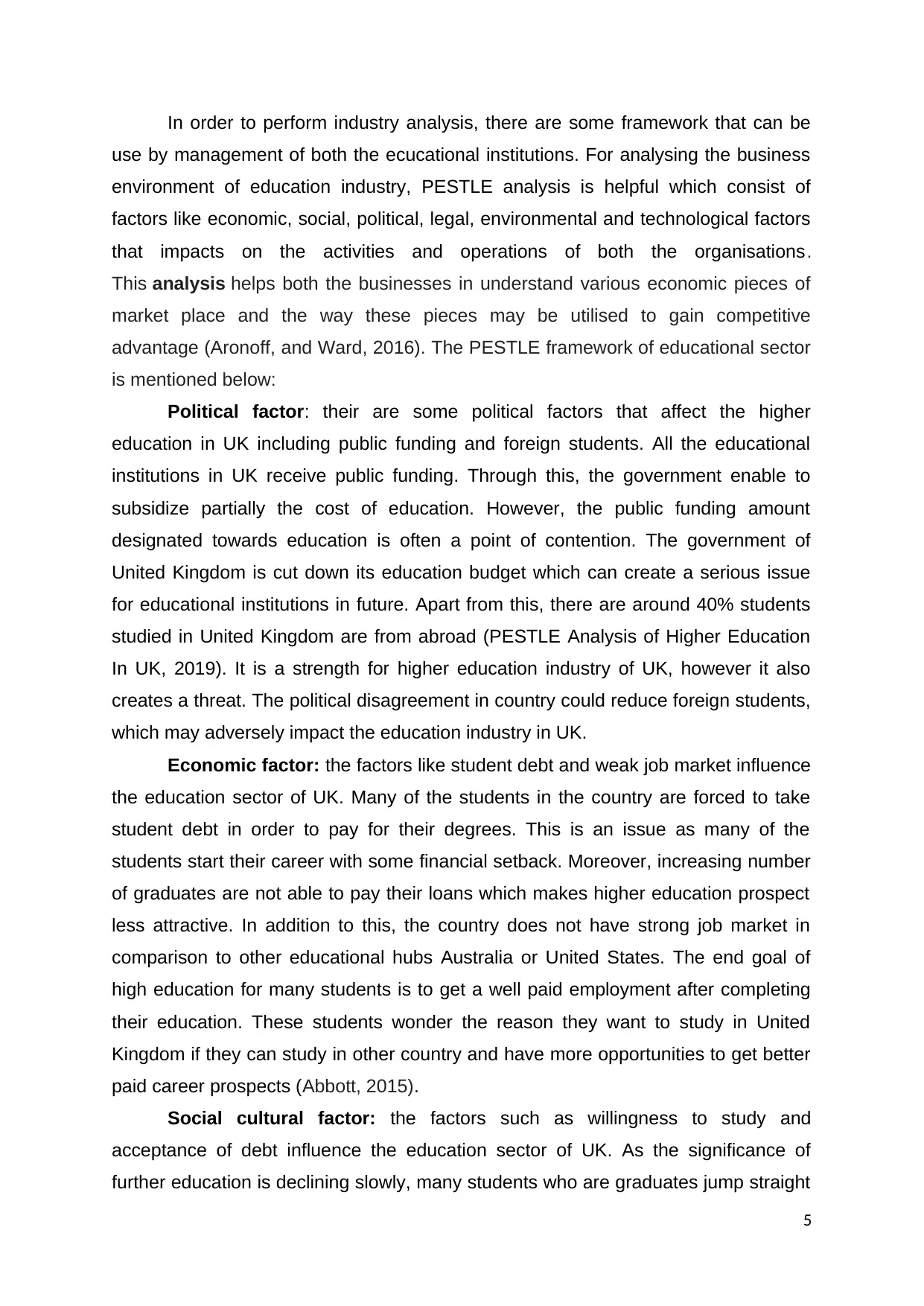
In order to perform industry analysis, there are some framework that can be
use by management of both the ecucational institutions. For analysing the business
environment of education industry, PESTLE analysis is helpful which consist of
factors like economic, social, political, legal, environmental and technological factors
that impacts on the activities and operations of both the organisations.
This analysis helps both the businesses in understand various economic pieces of
market place and the way these pieces may be utilised to gain competitive
advantage (Aronoff, and Ward, 2016). The PESTLE framework of educational sector
is mentioned below:
Political factor: their are some political factors that affect the higher
education in UK including public funding and foreign students. All the educational
institutions in UK receive public funding. Through this, the government enable to
subsidize partially the cost of education. However, the public funding amount
designated towards education is often a point of contention. The government of
United Kingdom is cut down its education budget which can create a serious issue
for educational institutions in future. Apart from this, there are around 40% students
studied in United Kingdom are from abroad (PESTLE Analysis of Higher Education
In UK, 2019). It is a strength for higher education industry of UK, however it also
creates a threat. The political disagreement in country could reduce foreign students,
which may adversely impact the education industry in UK.
Economic factor: the factors like student debt and weak job market influence
the education sector of UK. Many of the students in the country are forced to take
student debt in order to pay for their degrees. This is an issue as many of the
students start their career with some financial setback. Moreover, increasing number
of graduates are not able to pay their loans which makes higher education prospect
less attractive. In addition to this, the country does not have strong job market in
comparison to other educational hubs Australia or United States. The end goal of
high education for many students is to get a well paid employment after completing
their education. These students wonder the reason they want to study in United
Kingdom if they can study in other country and have more opportunities to get better
paid career prospects (Abbott, 2015).
Social cultural factor: the factors such as willingness to study and
acceptance of debt influence the education sector of UK. As the significance of
further education is declining slowly, many students who are graduates jump straight
5
use by management of both the ecucational institutions. For analysing the business
environment of education industry, PESTLE analysis is helpful which consist of
factors like economic, social, political, legal, environmental and technological factors
that impacts on the activities and operations of both the organisations.
This analysis helps both the businesses in understand various economic pieces of
market place and the way these pieces may be utilised to gain competitive
advantage (Aronoff, and Ward, 2016). The PESTLE framework of educational sector
is mentioned below:
Political factor: their are some political factors that affect the higher
education in UK including public funding and foreign students. All the educational
institutions in UK receive public funding. Through this, the government enable to
subsidize partially the cost of education. However, the public funding amount
designated towards education is often a point of contention. The government of
United Kingdom is cut down its education budget which can create a serious issue
for educational institutions in future. Apart from this, there are around 40% students
studied in United Kingdom are from abroad (PESTLE Analysis of Higher Education
In UK, 2019). It is a strength for higher education industry of UK, however it also
creates a threat. The political disagreement in country could reduce foreign students,
which may adversely impact the education industry in UK.
Economic factor: the factors like student debt and weak job market influence
the education sector of UK. Many of the students in the country are forced to take
student debt in order to pay for their degrees. This is an issue as many of the
students start their career with some financial setback. Moreover, increasing number
of graduates are not able to pay their loans which makes higher education prospect
less attractive. In addition to this, the country does not have strong job market in
comparison to other educational hubs Australia or United States. The end goal of
high education for many students is to get a well paid employment after completing
their education. These students wonder the reason they want to study in United
Kingdom if they can study in other country and have more opportunities to get better
paid career prospects (Abbott, 2015).
Social cultural factor: the factors such as willingness to study and
acceptance of debt influence the education sector of UK. As the significance of
further education is declining slowly, many students who are graduates jump straight
5
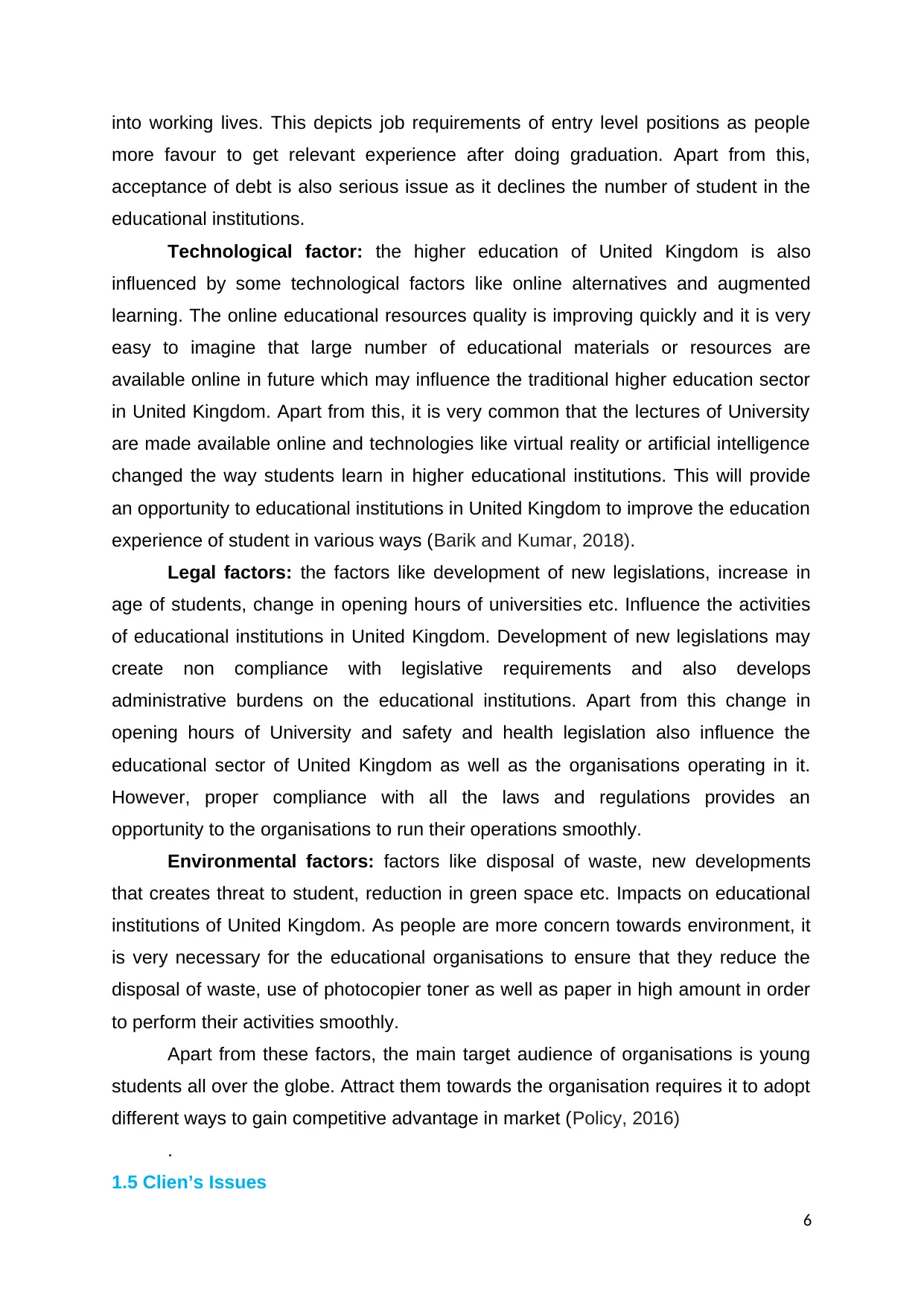
into working lives. This depicts job requirements of entry level positions as people
more favour to get relevant experience after doing graduation. Apart from this,
acceptance of debt is also serious issue as it declines the number of student in the
educational institutions.
Technological factor: the higher education of United Kingdom is also
influenced by some technological factors like online alternatives and augmented
learning. The online educational resources quality is improving quickly and it is very
easy to imagine that large number of educational materials or resources are
available online in future which may influence the traditional higher education sector
in United Kingdom. Apart from this, it is very common that the lectures of University
are made available online and technologies like virtual reality or artificial intelligence
changed the way students learn in higher educational institutions. This will provide
an opportunity to educational institutions in United Kingdom to improve the education
experience of student in various ways (Barik and Kumar, 2018).
Legal factors: the factors like development of new legislations, increase in
age of students, change in opening hours of universities etc. Influence the activities
of educational institutions in United Kingdom. Development of new legislations may
create non compliance with legislative requirements and also develops
administrative burdens on the educational institutions. Apart from this change in
opening hours of University and safety and health legislation also influence the
educational sector of United Kingdom as well as the organisations operating in it.
However, proper compliance with all the laws and regulations provides an
opportunity to the organisations to run their operations smoothly.
Environmental factors: factors like disposal of waste, new developments
that creates threat to student, reduction in green space etc. Impacts on educational
institutions of United Kingdom. As people are more concern towards environment, it
is very necessary for the educational organisations to ensure that they reduce the
disposal of waste, use of photocopier toner as well as paper in high amount in order
to perform their activities smoothly.
Apart from these factors, the main target audience of organisations is young
students all over the globe. Attract them towards the organisation requires it to adopt
different ways to gain competitive advantage in market (Policy, 2016)
.
1.5 Clien’s Issues
6
more favour to get relevant experience after doing graduation. Apart from this,
acceptance of debt is also serious issue as it declines the number of student in the
educational institutions.
Technological factor: the higher education of United Kingdom is also
influenced by some technological factors like online alternatives and augmented
learning. The online educational resources quality is improving quickly and it is very
easy to imagine that large number of educational materials or resources are
available online in future which may influence the traditional higher education sector
in United Kingdom. Apart from this, it is very common that the lectures of University
are made available online and technologies like virtual reality or artificial intelligence
changed the way students learn in higher educational institutions. This will provide
an opportunity to educational institutions in United Kingdom to improve the education
experience of student in various ways (Barik and Kumar, 2018).
Legal factors: the factors like development of new legislations, increase in
age of students, change in opening hours of universities etc. Influence the activities
of educational institutions in United Kingdom. Development of new legislations may
create non compliance with legislative requirements and also develops
administrative burdens on the educational institutions. Apart from this change in
opening hours of University and safety and health legislation also influence the
educational sector of United Kingdom as well as the organisations operating in it.
However, proper compliance with all the laws and regulations provides an
opportunity to the organisations to run their operations smoothly.
Environmental factors: factors like disposal of waste, new developments
that creates threat to student, reduction in green space etc. Impacts on educational
institutions of United Kingdom. As people are more concern towards environment, it
is very necessary for the educational organisations to ensure that they reduce the
disposal of waste, use of photocopier toner as well as paper in high amount in order
to perform their activities smoothly.
Apart from these factors, the main target audience of organisations is young
students all over the globe. Attract them towards the organisation requires it to adopt
different ways to gain competitive advantage in market (Policy, 2016)
.
1.5 Clien’s Issues
6
⊘ This is a preview!⊘
Do you want full access?
Subscribe today to unlock all pages.

Trusted by 1+ million students worldwide
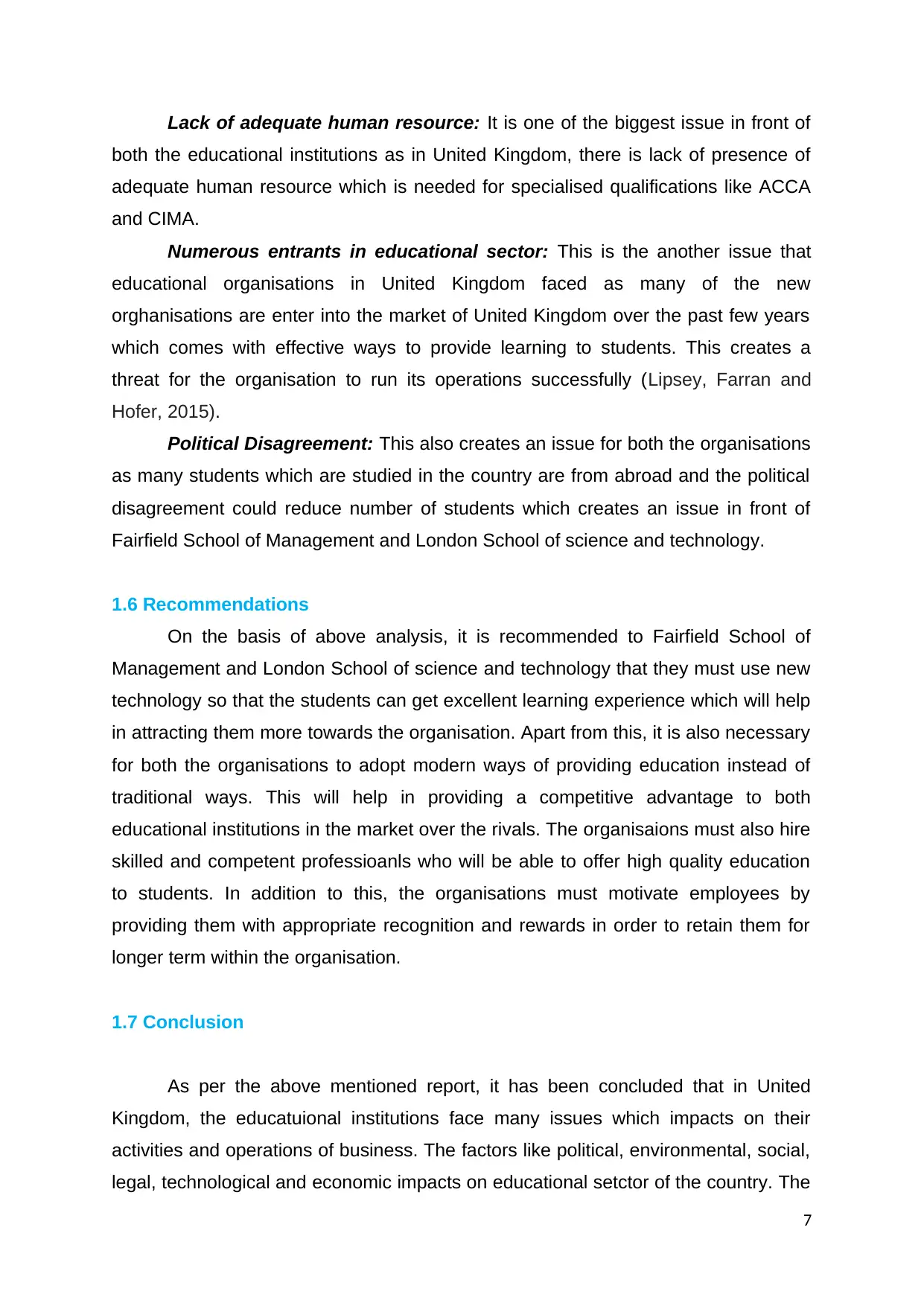
Lack of adequate human resource: It is one of the biggest issue in front of
both the educational institutions as in United Kingdom, there is lack of presence of
adequate human resource which is needed for specialised qualifications like ACCA
and CIMA.
Numerous entrants in educational sector: This is the another issue that
educational organisations in United Kingdom faced as many of the new
orghanisations are enter into the market of United Kingdom over the past few years
which comes with effective ways to provide learning to students. This creates a
threat for the organisation to run its operations successfully (Lipsey, Farran and
Hofer, 2015).
Political Disagreement: This also creates an issue for both the organisations
as many students which are studied in the country are from abroad and the political
disagreement could reduce number of students which creates an issue in front of
Fairfield School of Management and London School of science and technology.
1.6 Recommendations
On the basis of above analysis, it is recommended to Fairfield School of
Management and London School of science and technology that they must use new
technology so that the students can get excellent learning experience which will help
in attracting them more towards the organisation. Apart from this, it is also necessary
for both the organisations to adopt modern ways of providing education instead of
traditional ways. This will help in providing a competitive advantage to both
educational institutions in the market over the rivals. The organisaions must also hire
skilled and competent professioanls who will be able to offer high quality education
to students. In addition to this, the organisations must motivate employees by
providing them with appropriate recognition and rewards in order to retain them for
longer term within the organisation.
1.7 Conclusion
As per the above mentioned report, it has been concluded that in United
Kingdom, the educatuional institutions face many issues which impacts on their
activities and operations of business. The factors like political, environmental, social,
legal, technological and economic impacts on educational setctor of the country. The
7
both the educational institutions as in United Kingdom, there is lack of presence of
adequate human resource which is needed for specialised qualifications like ACCA
and CIMA.
Numerous entrants in educational sector: This is the another issue that
educational organisations in United Kingdom faced as many of the new
orghanisations are enter into the market of United Kingdom over the past few years
which comes with effective ways to provide learning to students. This creates a
threat for the organisation to run its operations successfully (Lipsey, Farran and
Hofer, 2015).
Political Disagreement: This also creates an issue for both the organisations
as many students which are studied in the country are from abroad and the political
disagreement could reduce number of students which creates an issue in front of
Fairfield School of Management and London School of science and technology.
1.6 Recommendations
On the basis of above analysis, it is recommended to Fairfield School of
Management and London School of science and technology that they must use new
technology so that the students can get excellent learning experience which will help
in attracting them more towards the organisation. Apart from this, it is also necessary
for both the organisations to adopt modern ways of providing education instead of
traditional ways. This will help in providing a competitive advantage to both
educational institutions in the market over the rivals. The organisaions must also hire
skilled and competent professioanls who will be able to offer high quality education
to students. In addition to this, the organisations must motivate employees by
providing them with appropriate recognition and rewards in order to retain them for
longer term within the organisation.
1.7 Conclusion
As per the above mentioned report, it has been concluded that in United
Kingdom, the educatuional institutions face many issues which impacts on their
activities and operations of business. The factors like political, environmental, social,
legal, technological and economic impacts on educational setctor of the country. The
7
Paraphrase This Document
Need a fresh take? Get an instant paraphrase of this document with our AI Paraphraser
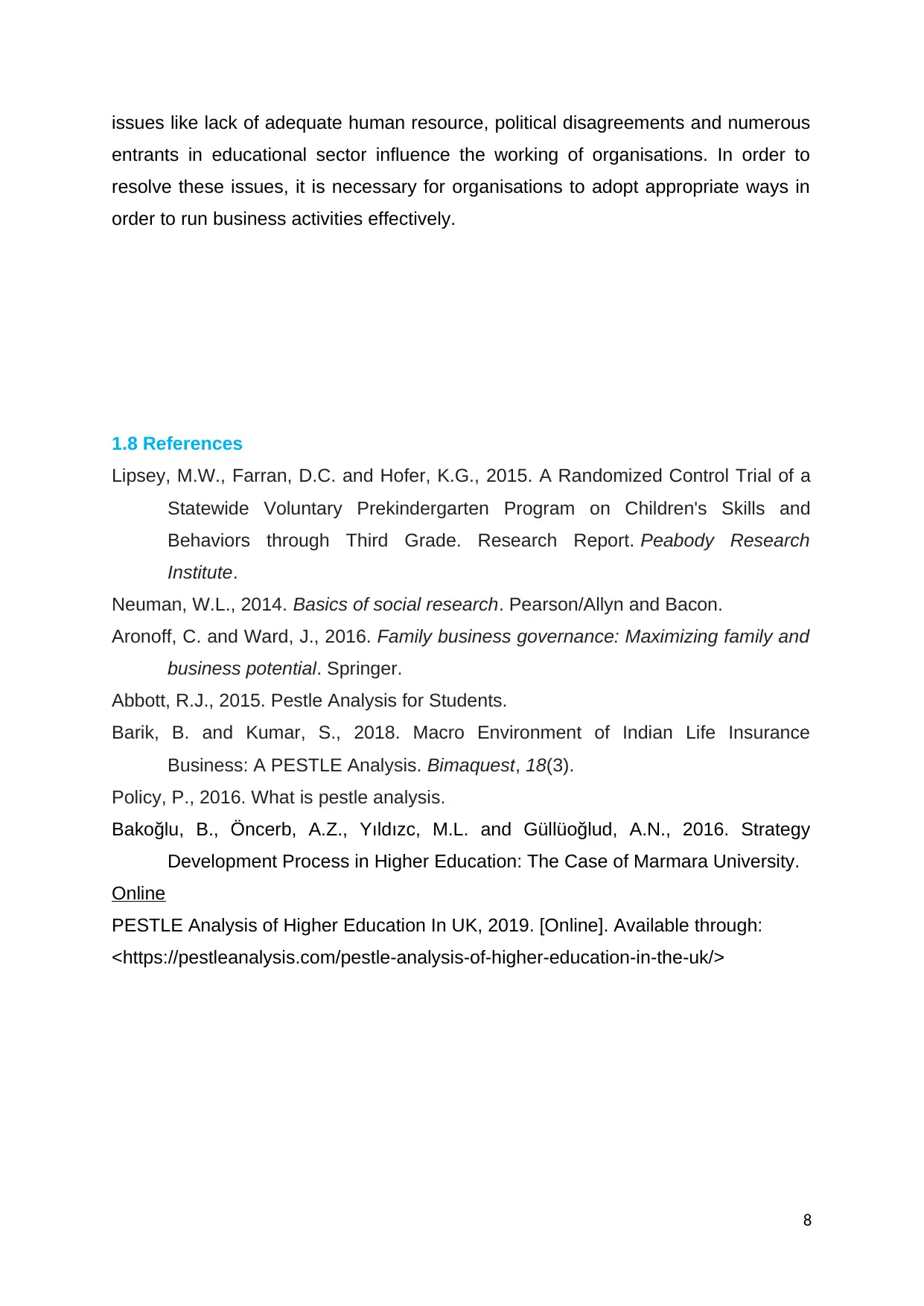
issues like lack of adequate human resource, political disagreements and numerous
entrants in educational sector influence the working of organisations. In order to
resolve these issues, it is necessary for organisations to adopt appropriate ways in
order to run business activities effectively.
1.8 References
Lipsey, M.W., Farran, D.C. and Hofer, K.G., 2015. A Randomized Control Trial of a
Statewide Voluntary Prekindergarten Program on Children's Skills and
Behaviors through Third Grade. Research Report. Peabody Research
Institute.
Neuman, W.L., 2014. Basics of social research. Pearson/Allyn and Bacon.
Aronoff, C. and Ward, J., 2016. Family business governance: Maximizing family and
business potential. Springer.
Abbott, R.J., 2015. Pestle Analysis for Students.
Barik, B. and Kumar, S., 2018. Macro Environment of Indian Life Insurance
Business: A PESTLE Analysis. Bimaquest, 18(3).
Policy, P., 2016. What is pestle analysis.
Bakoğlu, B., Öncerb, A.Z., Yıldızc, M.L. and Güllüoğlud, A.N., 2016. Strategy
Development Process in Higher Education: The Case of Marmara University.
Online
PESTLE Analysis of Higher Education In UK, 2019. [Online]. Available through:
<https://pestleanalysis.com/pestle-analysis-of-higher-education-in-the-uk/>
8
entrants in educational sector influence the working of organisations. In order to
resolve these issues, it is necessary for organisations to adopt appropriate ways in
order to run business activities effectively.
1.8 References
Lipsey, M.W., Farran, D.C. and Hofer, K.G., 2015. A Randomized Control Trial of a
Statewide Voluntary Prekindergarten Program on Children's Skills and
Behaviors through Third Grade. Research Report. Peabody Research
Institute.
Neuman, W.L., 2014. Basics of social research. Pearson/Allyn and Bacon.
Aronoff, C. and Ward, J., 2016. Family business governance: Maximizing family and
business potential. Springer.
Abbott, R.J., 2015. Pestle Analysis for Students.
Barik, B. and Kumar, S., 2018. Macro Environment of Indian Life Insurance
Business: A PESTLE Analysis. Bimaquest, 18(3).
Policy, P., 2016. What is pestle analysis.
Bakoğlu, B., Öncerb, A.Z., Yıldızc, M.L. and Güllüoğlud, A.N., 2016. Strategy
Development Process in Higher Education: The Case of Marmara University.
Online
PESTLE Analysis of Higher Education In UK, 2019. [Online]. Available through:
<https://pestleanalysis.com/pestle-analysis-of-higher-education-in-the-uk/>
8
1 out of 8
Related Documents
Your All-in-One AI-Powered Toolkit for Academic Success.
+13062052269
info@desklib.com
Available 24*7 on WhatsApp / Email
![[object Object]](/_next/static/media/star-bottom.7253800d.svg)
Unlock your academic potential
Copyright © 2020–2025 A2Z Services. All Rights Reserved. Developed and managed by ZUCOL.





